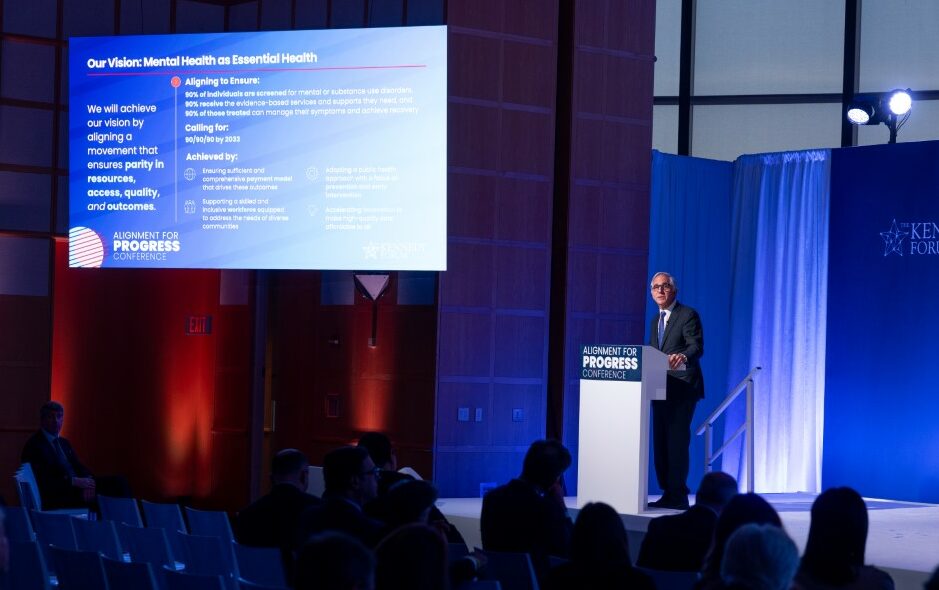The Kennedy Forum executes its policy work at the federal and state levels, working in coalition with others in the mental health movement, by developing policy recommendations, educating policymakers on proposals, drafting whitepapers and policy briefs, conducting policy research, testifying, writing statements, and conducting coordinated advocacy with other organizations in support of our major focus areas and the National Strategy.
Policy Highlights, 2023-2024
Ensuring Access to Mental Health and Substance Use Disorder Care:
- MHPAEA Proposed Rules Relating to the Mental Health Parity and Addiction Equity Act and DOL/HHS/Treasury “Technical Release” Relating to Plans’ Required MH/SUD Data Collection: TKF led comments on the Department of Health and Human Services, Employee Benefits Security Administration, and the Internal Revenue Service’s proposed rule, Requirements Related to the Mental Health Parity and Addiction Equity Act (”2023 Proposed Rule”). This advocacy included three letters in total, including an MHLG letter signed by 60 organizations, a letter on technical comments signed by 15 organizations, and our own comment letter on the technical release.
- Center for Medicaid and CHIP Services (CMCS) Request for Comments on Processes for Assessing Compliance with Mental Health Parity and Addiction Equity in Medicaid and CHIP (CHIP): TKF led comments, along with 26 other advocacy organizations, to the Center for Medicaid and CHIP Services’ (CMCS) request for comments on processes for assessing compliance with mental health parity and addiction equity in Medicaid and the Children’s Health Insurance Program.
- DEA and HHS Proposed Rule Related to Induction of Buprenorphine via Telemedicine: TKF led a letter along with 67 organizations to AG Garland, Secretary Becerra, DEA administrator Milgram, and Secretary Delphin-Rittmon urging the US Drug Enforcement Administration and the Department of Health and Human Services to withdraw the proposed rule and continue the telehealth flexibilities under the Opioid Public Health Emergency to ensure on-going access to life-saving medications for individuals with opioid use disorders. We further requested that DEA and HHS significantly alter the proposed rule relating to mental health medications, which will restrict access to urgently needed treatment, particularly in areas with a shortage of mental health providers. This, in part, led the DEA to postpone the ending of flexibilities through July.
Supporting Young People and Promoting Mental Health From the Start:
- CMS Medicaid Claiming Guide: In 2023, CMS released an updated school Medicaid claiming guide. TKF joined with other mental health advocates in meeting with the Administration to ensure that the claiming guide increased access to mental health and substance use services for youth in schools on Medicaid. TKF continues to work with partners to promote implementation of the guide and ensure that it translates to improved outcomes for young people.
- FTC Petition for Rulemaking on Youth Mental Health and Social Media: TKF joined with a coalition of advocacy groups in supporting a US Federal Trade Commission (FTC) petition for rulemaking, asking that the Commission promulgate a rule prohibiting the use of certain types of engagement-optimizing design practices on individuals under the age of 18 (“minors”) in connection with internet services. This can help to ensure that online spaces are safe for young people as our nation faces a crisis in youth mental health.
The Alignment for Progress

Goals for the Alignment for Progress Movement: 90/90/90 by 2033
As part of the Alignment for Progress, we have articulated goals for 2023: 90% of individuals will be screened for mental health conditions or substance use disorders; 90% will receive the evidence-based services and supports they need, and 90% of those treated will be able to manage their symptoms and achieve recovery.
Read More About These Goals
Collaborating for Systemic Change
The Kennedy Forum's Alignment for Progress unites stakeholders to accelerate progress in the systems of mental health and substance use disorder care to ensure a more inclusive and effective system. We are calling, urgently, for stakeholders from across the mental health and substance use landscape to join us.
Explore the Alignment for Progress
Comprehensive Policies for Change
The Kennedy Forum has created the National Strategy for Mental Health and Substance Use Disorders as part of The Alignment for Progress to tackle systemic barriers in U.S. mental health and substance use care. This strategy provides a blueprint for achieving mental health equity and systemic change, featuring over 200 policy recommendations to overhaul the existing care framework.
Learn more about the National Strategy